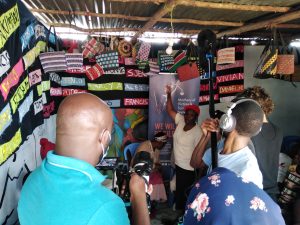
Hamimu Masudi, our Policy and Campaigns Officer, talks about his experience of producing our latest film on vaccine justice.
On a bright June morning in Nairobi’s Mathare neighbourhood, Kenyan film maker, Tasmin sat down with 24 year old Tash and Mama Victor, a grandmother – turned human rights campaigner.
She wanted to stir up a conversation on the detrimental impact, COVID lockdowns had on women’s and girls’ efforts to free themselves from patriarchy. There was no better way than to listen to a cohort representing a different generation, but living and experiencing life in the present.
“Your voice is much louder, and it is heard more than it was during our time, at your age.” Mama Victor, confessed to Tash about her experience, before the UN made decisions such as the 1995 Beijing declaration. The declaration was a comprehensive landmark policy framework on women’s human rights, that set into motion some key successes, the feminist movement has clawed back, after being taken away by patriarchy.
You can watch our latest film here.
Mama Victor (real name, Benna Buluma), is more resilient than I could imagine. A grandmother of four orphans, whose dads (Mama Victor’s two own sons) lost their lives to violence in 2017. Together with a group of women in related situations, she formed a network of mothers of victims and survivors of violence, to seek justice and to mobilise her own community against violence.
Tash (real name, Glades Mwangi), on the other hand is a professional ballerina, a millennial born just before the advent of the Millennium Declaration in 2000, that ushered in policies on universal free primary education, gender equality and maternal health.

Filming at Mathare, Nairobi. Speaking with women from Mothers of Victims & Survivors Network. Backdrop, textiles with names of survivors and victims.
Until the COVID pandemic, she lived her life as an avid dancer –an occupation, but also, in her own words, “my kind of therapy and a way of expressing my independence.” Unfortunately, the COVID pandemic lockdowns put a stop to this, “as a [young] woman, I felt robbed,” Tash declared.
“I agree, it took us steps backwards”, Mama Victor echoed, adding that due to closure of schools, which are known as safe spaces for girls to learn and grow, many girls were exposed to gender based violence, sexual harassment and child labour, and ending up as traumatised young mothers, a lost generation.
As I followed the conversation keenly, my mind raced back to Tasmin’s earlier interview with Mary (not her real name). Mary had explained how she had endured, throughout the pandemic, endless physical and verbal harassment in her home. Her inability to move out and seek help, coupled with fear and powerlessness, brought her close to ending her own life.
At this point, I could see clearly, in real-time, the harm caused by disparities in vaccine access. The delays in access had prolonged the lock downs, resulting in the removal of structures that Mary, and other survivors would have used to shield themselves against abuse or that would have protected the female pupils from early pregnancies.
In the end, I reckoned that, unless decisive action is taken, the lives that were lost and changed forever due to vaccine injustice will forever remain a dark stain on our collective conscience.
You can watch our latest film here.

